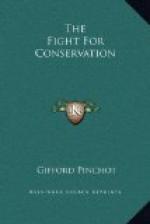Our country began as a nation of farmers. During the periods that gave it its character, when our independence was won and when our Union was preserved, we were preeminently a nation of farmers. We can not, and we ought not, to continue exclusively, or even chiefly, an agricultural country, because one man can raise food enough for many. But the farmer who owns his land is still the backbone of this Nation; and one of the things we want most is more of him. The man on the farm is valuable to the Nation, like any other citizen, just in proportion to his intelligence, character, ability, and patriotism; but, unlike other citizens, also in proportion to his attachment to the soil. That is the principal spring of his steadiness, his sanity, his simplicity and directness, and many of his other desirable qualities. He is the first of home-makers.
The nation that will lead the world will be a Nation of Homes. The object of the great Conservation movement is just this, to make our country a permanent and prosperous home for ourselves and for our children, and for our children’s children, and it is a task that is worth the best thought and effort of any and all of us.
To achieve this or any other great result, straight thinking and strong action are necessary, and the straight thinking comes first. To make this country what we need to have it, we must think clearly and directly about our problems, and above all we must understand what the real problems are. The great things are few and simple, but they are too often hidden by false issues, and conventional, unreal thinking. The easiest way to hide a real issue always has been, and always will be, to replace it with a false one.
The first thing we need in this country, as President Roosevelt so well set forth in a great message which told what he had been trying to do for the American people, is equality of opportunity for every citizen. No man should have less, and no man ought to ask for any more. Equality of opportunity is the real object of our laws and institutions. Our institutions and our laws are not valuable in themselves. They are valuable only because they secure equality of opportunity for happiness and welfare to our citizens. An institution or a law is a means, not an end, a means to be used for the public good, to be modified for the public good, and to be interpreted for the public good. One of the great reasons why President Roosevelt’s administration was of such enormous value to the plain American was that he understood what St. Paul meant when he said: “The letter killeth, but the spirit giveth life.” To follow blindly the letter of the law, or the form of an institution, without intelligent regard both for its spirit and for the public welfare, is very nearly as dangerous as to disregard the law altogether. What we need is the use of the law for the public good, and the construction of it for the public welfare.




